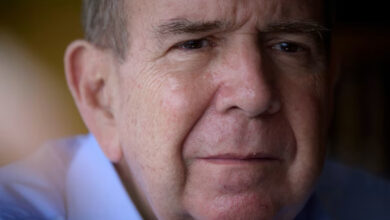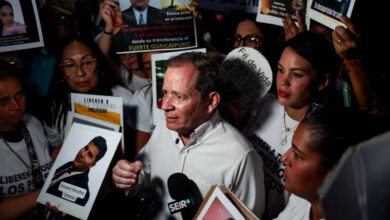Venezuelan President Hugo Chavez died on Tuesday after 14 years in power, during which he remodeled the OPEC country's oil sector and nationalized foreign-run oil fields.
Oil production fell sharply during his era, dropping from some 3.5 million barrels per day when he was elected. After years of decline, Venezuela pumped just 2.34 million barrels per day last month, according to a Reuters survey of analysts who track OPEC output levels.
Venezuelan government estimates on production are higher, around 3 million barrels a day, but they are largely discredited in oil industry circles.
Amid refinery woes, Venezuela has also been importing more fuel products from the United States, which remains a big buyer of Venezuelan crude exports.
Oil prices rose slightly, by some 30 cents a barrel, in the hour following the announcement of Chavez's death late on Tuesday.
AMY MYERS JAFFE, ENERGY AND GEOPOLITICS EXPERT, University of California at DAVIS IN CALIFORNIA:
"Chavez's death may result in a period of political instability and uncertainty in Venezuela. That is never a good thing for oil exports.
"Venezuela's oil industry has had major setbacks during the Chavez era. Venezuela has mortgaged its future and, like Mexico, it depends so heavily on oil (revenue) that it will have little choice but to do whatever it can to boost exports.
"Venezuela needs money. Whatever comes next, it won't have the kind of charismatic leader that Chavez was. It will have to get serious about rebuilding its oil industry."
DANIEL YERGIN, VICE CHAIRMAN OF IHS, INC., ENERGY AUTHOR:
"It's too soon to say what Chavez's death means for oil prices, but it is certainly true that oil prices are what made Chavez possible."
"The collapse of oil prices in 1997-8 and the resulting discontent in Venezuela gave him the opening to become president, just seven years after he was sent to jail for leading a coup. And it was rising oil prices since 2000 that gave him the financial resources to consolidate power, court public opinion and try to turn his Bolivarian revolution into a global campaign for 21st century socialism.
"He leaves behind an economy greatly weakened by spending, intervention, inflation capital flight, and shortages. And, beyond Cuba, his effort to create an alliance against what he called ‘the US empire’ managed only to enlist a few countries.
"Without his charisma and force of character, it is not all clear how his successors will maintain the system he created."
TIM EVANS, ENERGY FUTURES SPECIALIST, CITI FUTURES PERSPECTIVE, NEW YORK CITY:
"I don't think anybody gets a windfall out of this. If it opens the country up to more investment that may be an opportunity for profit, but it's also a risk. Chavez was not the first one to nationalize oil operations in Venezuela.
"There was a prior cycle of nationalization in the 1970s so the country has this history of some periods where international investment is welcome and encouraged and other periods in which the government of the day decides they don't like the terms of the investment and they take it back.
"So I don't know how eager oil companies would be to return to Venezuela."
KATHERINE SPECTOR, HEAD OF COMMODITY STRATEGY AT CIBC WORLD MARKETS IN NEW YORK:
"My expectation is that we will see the status quo, with a transition to a similar style of government from Chavez's successor.
"On the off chance that we do see the opposition make some headway, with a move to a more liberal government, the key thing for oil is that even if some in the market think this might weigh on prices in expectations of increased supplies, the reality is that the industry needs the kind of investment that takes years, not months.
"On the flip side, we may see some oil traders decide this is bullish if they expect there might be a period of instability after Chavez's death, but I don't think that's the most likely outcome."
ANDREW LIPOW, PRESIDENT, LIPOW OIL ASSOCIATES, HOUSTON, TEXAS:
"Venezuelan imports of petroleum products have been rising from the US and in fact in December Venezuela imported a record amount of petroleum products from the US — 197,000 barrels per day, about half of which happened to be gasoline … So what we see is Venezuela has actually increased its dependence on the US while, vice-versa, the US is reducing its dependence on Venezuelan oil.
"I don't expect any change in Venezuelan production in the near term."
JAMES L. WILLIAMS, ENERGY ECONOMIST, WTRG ECONOMICS, LONDON, ARKANSAS:
"The uncertainty in Venezuela is going to give us a short-term increase in prices and whatever it contributes to prices because of that uncertainty should go away in 30 to 60 days if the election is peaceful and the transition to a new government is okay … On the other hand, we've got bad economies in Europe, pretty weak in the US, and China with a housing bubble to put downwards pressure on prices."




